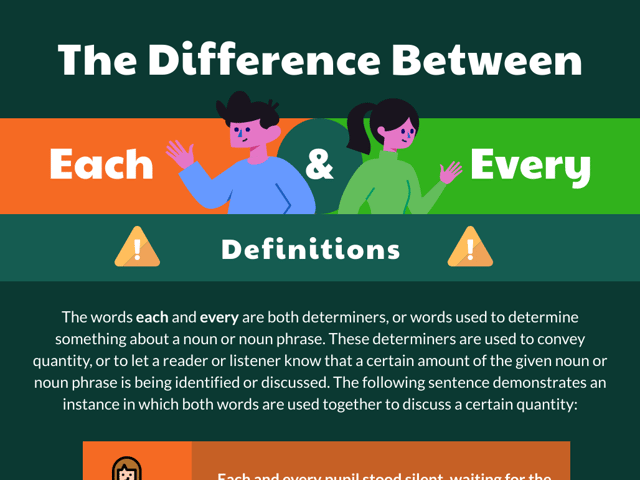
The Difference Between “Each” and “Every”
Learning the difference between “each” and “every” can be difficult, even for native English speakers. In some cases, the two can be used interchangeably. In others, swapping one for the other results in a convoluted sentence that simply sounds “off”. To break down when to use “each” and when to use “every” in a sentence, we will first identify what they are, then determine how they are similar and how they are different.
Each and Every: Definitions
The words each and every are both determiners, or words used to determine something about a noun or noun phrase. These determiners are used to convey quantity, or to let a reader or listener know that a certain amount of the given noun or noun phrase is being identified or discussed. The following sentence demonstrates an instance in which both words are used together to discuss a certain quantity:
Each and every pupil stood silent, waiting for the return of their teacher.
In the sentence above, the words are used together to convey a similar concept.
Each and Every: Similarities
The similarities between the words are numerous. Both are used to denote something about the quantity of a noun. Both are used to draw attention to a specific person, place, or thing. They can both be used to modify nouns, and can be used in the place of one another in many contexts.
The following sentences can use these words interchangeably:
Each/Every time I think I’ve got it all together, I find that I have something new to learn.
Each/Every person in the room was riveted.
Now, we’ll dive into the differences between the words and their correct usage in a sentence.
Each and Every: Differences
The differences between the words are similarly significant. While every is used to describe a collective whole (think “every person there wore an expression of awe”), each is used to single out people within that collective whole (think “each person in attendance wore an expression of awe”). Although the two sentences are essentially saying the same thing (that all attendees wore the same expression), the connotation of the words differs significantly. Every suggests a sense of community and wholeness, while each suggests that the people in attendance are their own, unique entities.
When to Use Each
To know when to use each, pay close attention to pronouns. Each is best used alongside a pronoun, and may or may not be accompanied by the word of to add clarity to a sentence. Note its proximity to pronouns in the examples below:
“Each of his children felt that they were unfairly excluded.”
“They each had their own story to tell.”
“All of the animals were beautiful and each had their own unique traits to recommend them to prospective families.”
When to Use Every
To determine when it is best to use every, look out for adverbs, abstract thinking, and possessives. Each of these words is best accompanied by the word every rather than the word each, as the sentences below demonstrate.
Abstract thinking: “Every new bit of deceit drove a nail further into the relationship.”
Adverbs: “Every other staff member nearly fainted at the sound of sirens.”
Possessives: “Her every word elicited a sense of grandeur and inspiration.”
While there are various contexts that allow the use of “each” and “every” interchangeably, using the guidelines above, you can use the words in any circumstance without confusion.

Keep Reading

HiSET Test Blog
Must-Know Science Formulas for the HiSET Test
Achieving proficiency in science can be challenging. If you’re studying…

HiSET Test Blog
Is the HiSET Easier Than the GED?
Over 2 million 16-24-year-olds in the U.S. lack a high school education…

HiSET Test Blog
The HiSET vs the GED: What’s the Difference?
There are several exams that can be taken as an alternative to receivin…